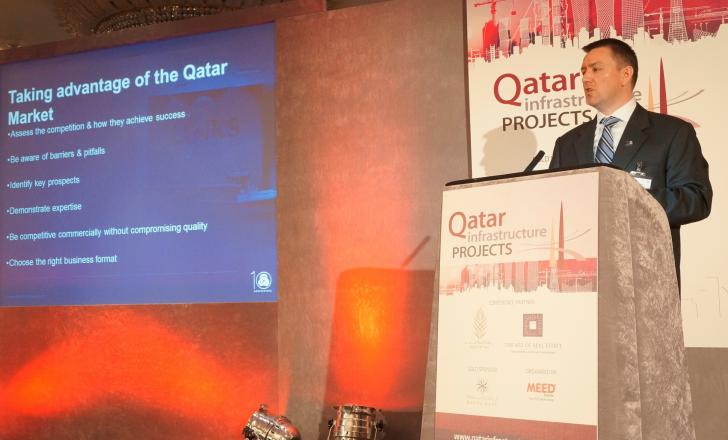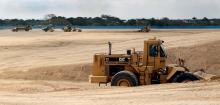Foreign companies aiming to deliver lucrative infrastructure projects in Qatar will need to reconsider their tender process approach, according to experts assembled at the MEED Qatar Infrastructure Projects conference in London. Participating speakers said international contractors need to be more strategic about their business development practices in the Gulf state and act more transparently during the bid phase to improve tender conversion rates.

Stuart Curtis, MD of The Links Group
Foreign companies aiming to deliver lucrative infrastructure projects in Qatar will need to reconsider their tender process approach, according to experts assembled at the 6041 Meed Qatar Infrastructure Projects conference in London.
Participating speakers said international contractors need to be more strategic about their business development practices in the Gulf state and act more transparently during the bid phase to improve tender conversion rates.
“With more than US$70 billion worth of major projects to be awarded until 2022, Qatar remains one of the most robust global markets for construction companies. However, tendering for the major contracts will require more transparency on the part of contractors as the Gulf state seeks to appoint partners that can satisfy the technical and financial requirements of each project while showing their genuine commitment to the National Vision 2030,” said Stuart Curtis, group managing director at6043 The Links Group.
During the four-day conference, British companies gained detailed insights into all areas of Qatar’s non-energy economy as the country continues on its remarkable and comprehensive investment programme.
According to Ian Lyne, development strategy director at Place Dynamix (Middle East) and previously project manager of the multi-disciplinary team responsible for the preparation of the Qatar National Master Plan, procurement in the Gulf State has slowed as it re-evaluates development priorities ahead of the 2022 FIFA World Cup. However, he says Qatari clients are using the period to ensure they bring in the right expertise to deliver their massive infrastructure projects on time and to specification with minimal risk of additional contractual claims.
One example, according to Lyne, is the new Doha Port project which has moved its tender and bid process online in an effort to make the tender process more efficient, competitive and to improve the overall quality of submissions. All details of past, current and future tender packages are now available on its website. The authority also publishes the names of all companies who apply for prequalification as well as the names of those who get shortlisted.
“We are trying to improve transparency between the client and bidders,” said engineer Nabeel Mohammed A. R. Al Buenain, project executive director, New Doha Port. “Some companies have complained to us about publishing their names when they have not prequalified, but we believe this creates a more competitive and fair marketplace. There are six criteria which bidders must satisfy before tendering for our projects. They must have acceptable cash flow, experience in the field, the right equipment, skills and staff and be committed to the project and Qatar. It is very important that submissions demonstrate capability in each of these areas.”
The Links Group says Qatar’s shift towards transparency can play to British companies’ advantage.
“Qatar is undergoing a mindset shift to get what they want, on time, with quality and to the right specification. This move towards a transparent tender market is not necessarily an issue for larger British contractors who already have to comply with strict regulation and due diligence policies mandated by their government and company boards,” said Curtis.
However, The Links Group also says foreign companies that establish the correct commercial presence on the ground in Qatar will be better placed to bring more local market intelligence to their tender submissions.
“Foreign companies often like to wait until they win a contract before incorporating a commercial presence overseas. But this approach no longer carries favour with Qatari clients. They want to know the foreign company is committed to the long term development of Qatar and are serious about investing in their country’s growth,” said Wayne Merrick, Qatar general manager at The Links Group.
The MEED Qatar Infrastructure Projects conference took place from July 2-5, 2012 at the Jumeirah Carlton Tower Hotel in London.
Participating speakers said international contractors need to be more strategic about their business development practices in the Gulf state and act more transparently during the bid phase to improve tender conversion rates.
“With more than US$70 billion worth of major projects to be awarded until 2022, Qatar remains one of the most robust global markets for construction companies. However, tendering for the major contracts will require more transparency on the part of contractors as the Gulf state seeks to appoint partners that can satisfy the technical and financial requirements of each project while showing their genuine commitment to the National Vision 2030,” said Stuart Curtis, group managing director at
During the four-day conference, British companies gained detailed insights into all areas of Qatar’s non-energy economy as the country continues on its remarkable and comprehensive investment programme.
According to Ian Lyne, development strategy director at Place Dynamix (Middle East) and previously project manager of the multi-disciplinary team responsible for the preparation of the Qatar National Master Plan, procurement in the Gulf State has slowed as it re-evaluates development priorities ahead of the 2022 FIFA World Cup. However, he says Qatari clients are using the period to ensure they bring in the right expertise to deliver their massive infrastructure projects on time and to specification with minimal risk of additional contractual claims.
One example, according to Lyne, is the new Doha Port project which has moved its tender and bid process online in an effort to make the tender process more efficient, competitive and to improve the overall quality of submissions. All details of past, current and future tender packages are now available on its website. The authority also publishes the names of all companies who apply for prequalification as well as the names of those who get shortlisted.
“We are trying to improve transparency between the client and bidders,” said engineer Nabeel Mohammed A. R. Al Buenain, project executive director, New Doha Port. “Some companies have complained to us about publishing their names when they have not prequalified, but we believe this creates a more competitive and fair marketplace. There are six criteria which bidders must satisfy before tendering for our projects. They must have acceptable cash flow, experience in the field, the right equipment, skills and staff and be committed to the project and Qatar. It is very important that submissions demonstrate capability in each of these areas.”
The Links Group says Qatar’s shift towards transparency can play to British companies’ advantage.
“Qatar is undergoing a mindset shift to get what they want, on time, with quality and to the right specification. This move towards a transparent tender market is not necessarily an issue for larger British contractors who already have to comply with strict regulation and due diligence policies mandated by their government and company boards,” said Curtis.
However, The Links Group also says foreign companies that establish the correct commercial presence on the ground in Qatar will be better placed to bring more local market intelligence to their tender submissions.
“Foreign companies often like to wait until they win a contract before incorporating a commercial presence overseas. But this approach no longer carries favour with Qatari clients. They want to know the foreign company is committed to the long term development of Qatar and are serious about investing in their country’s growth,” said Wayne Merrick, Qatar general manager at The Links Group.
The MEED Qatar Infrastructure Projects conference took place from July 2-5, 2012 at the Jumeirah Carlton Tower Hotel in London.





